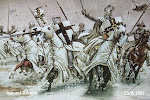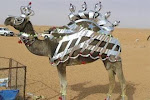So the poor blood thirsty Animalstinians are out of cows to slaughter with their bare hands as the moon god allah told them to kill in his name?
RAFAH, Gaza Strip -- Salah Afana's cattle business usually booms with the approach of the Muslim feast of the sacrifice. But this year he has hit a snag: He's out of cows.
Mr. Afana, Gaza's largest cattle trader, has been unable to import cows since Israel shut the strip's borders last month in response to Palestinian rocket fire. He since has sold all his stock -- less than half of what he sold last year -- and is turning customers away.
The Gaza-wide shortage of cows and sheep for slaughter is one of many disappointments Gazans face before Eid al-Adha, the most important holiday in the Muslim calendar. For them it's tantamount to Thanksgiving without turkey.
The four-day holiday beginning today is supposed to be one of the year's most joyful, but nothing is as it should be, Gazans say. An Israeli blockade on the ruling Hamas government has caused shortages of basic goods, and Palestinian political squabbling has kept thousands of would-be pilgrims from traveling to Mecca.
On top of that, their banks have run out of currency, depriving thousands of civil servants of salaries.
It's a sharp contrast to Bethlehem, in the West Bank, which after several bleak years is finally getting a Christmas season to cheer about. Hotels are booked solid, Manger Square outside Christ's traditional birthplace is already bustling with tourists, and Palestinian and Israeli security forces are working together to keep the peace.
"We're under siege, the pilgrims can't get out, and there's no money. How can we celebrate the holiday?" said Mahmoud Khozendar, a Gaza doctor.
Eid al-Adha commemorates the readiness of Abraham -- Ibrahim to Muslims -- to sacrifice his son as an act of obedience to God, who stays his hand and provides a lamb instead.Gaza has about 10,000 sheep, half of the number needed for the holiday, said Ibrahim al-Kidra of the Agriculture Ministry. The price of a sheep has nearly tripled, to about $550, and there's little money available to buy them. For those lucky enough to find a cow, prices have jumped by a third, to about $2,000 each.
In a letter obtained by The Associated Press, Jihad al-Wazir of the Palestinian Monetary Authority begged Israel to allow his agency to send money to Gaza. He said Gaza's banks hold 47 million shekels ($12 million) --less than a fifth of what is needed to pay the public servants.
Israeli officials say the request is being considered.
12 years ago






















No comments:
Post a Comment